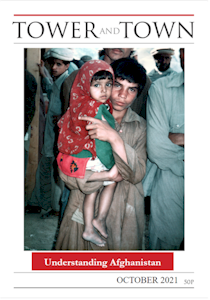

Tower and Town, October 2021 (view the full edition) (view the full edition)System FailureThe rapid collapse of the government of the Islamic Republic of Afghanistan provoked a welter of think tank analyses, political recriminations, and breathless media coverage, with responsibility pinned either onto the hasty manner of the United States' withdrawal, faulty intelligence, or the alleged inadequacy of the Afghan security forces. Regardless of these assessments, the events in Afghanistan constitute a systemic failure. But it was avoidable.
Historically, there are comparable cases of systemic collapse. These can be seen, not in the shallow sense of the optical similarities of the fall of Saigon, but in the stresses, thresholds, and tolerances of regimes. Under similar conditions, not all systems fail so comprehensively, suggesting that the haste of the US withdrawal, conducted without consultation of Allies, was indeed the critical factor.
Surveying previous insurgencies, it is clear that when governments fail, they do so rapidly. When insurgent movements are defeated, they tend to do so gradually, indicated by steady splintering and factionalism. The Taliban had started to fragment in 2015-16. They had inflicted heavy losses on the Afghan government forces, but the emergence of 'IS-Khorassan', a faction emulating Daesh, indicated that there were divisions. However, repeated US announcements of withdrawal kept the insurgent factions together. Pakistan continued to supply the Taliban and its other confederates, and to provide the mountainous border region to base the fighters and their commanders, while keeping up the pretence of alignment with the United States. The younger cohorts of insurgents had been steadily radicalised by Deobandi, Salafi, and Wahabi ideologues. There is every prospect that the radicalised movement that now holds power in Kabul will steadily impose its brutal variant of governance: it is the nature of revolutionaries to brook no criticism and to exact revenge.
Is Taliban rule now established? They may yet suffer the fate of Daesh. On Afghanistan's national day (19 August) protestors were tearing down Taliban banners and putting the national flag back up. The divisions and fissures that had riven Afghan society are still there, and now the unifying element of a corrupted government has gone, so it seems that a new pulse of civil violence is highly likely.
There is the question of the longer term significance. Is this the watershed, as 9/11 was purported to be, or just a phase in a continuum, as the fall of South Vietnam proved to be? Does it mark a more seismic defeat of the Western world, its democratising project, and its 'rules-based international system' established in 1944-45, or will it galvanise the West?
Finally, those who advocated for so long that the West should withdraw, 'stop the war', and bring the troops home, got their wish. Here are the consequences.
****************
Dr Rob Johnson is the author of The Afghan Way of War (2011) and co-editor of At the End of Military Intervention, with Dr Tim Clack (2014). Dr Rob Johnson |